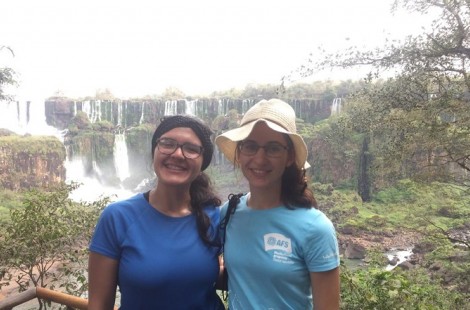
My aim for this summer was to visit a Latin American country in order to practice my Spanish and experience solo travel with a social and anthropological focus – to meet locals and learn about the country’s culture, politics and history. Paraguay came to mind because of my Paraguayan friend Vanina, and it ended up being the perfect choice for such immersive exploration, and despite being one of the most overlooked South American countries, it proved to provide a great opportunity to explore both nature and culture. Through daily interactions, I got to know a lot about the local people and their culture; I managed to engage with them in a deeper way than if I had travelled accompanied. When travelling in the colectivos, the local buses, and eating in the comedores, the local eateries, I engaged in conversations with the people around me, learning about the marginalisation of the native guaraní people, the destructive War of the Triple Alliance, or about the politics of the binational Itaipú Dam.
The people I met truly made my trip. Patricio, a Paraguayan whom I met in transit at the São Paulo airport, taught me so much about Paraguayan food, culture and history that I felt I’d visited the country before even crossing border control. Leliz, the incredibly knowledgeable tour guide at the Santa María de Fe museum of Jesuit-guaraní art, explained the main tenets of guaraní philosophy to me, and I will hopefully get to meet her again when she visits Cambridge next January. I had an interesting conversation about religion and spirituality with Victor, an Asunciónbased musician with whom I chatted briefly on the bus. Everybody I met was really friendly and helpful, and a special shoutout goes to the Ybycuí National Park rangers Elder and Edgardo who gave me a lift to the bus stop on my way back and shared their views on nature conservation and on the forest fires in the country's Chaco region.
Speaking of the people who made my trip incredible, I can’t not mention my dear friend Vanina. We met three years ago when she spent a year at my high school as an exchange student, during which I showed her around Prague and helped her understand our culture. During my visit, our roles were reversed, and Vanina helped me explore Asunción and beyond and taught me about Paraguayan traditions, from the communal ritual of drinking tereré tea to the traditional Sunday family barbecue, asado. She also taught me a few words in the indigenous guaraní language, which is combined with Spanish in everyday Paraguayan conversations, with the first word I learned being, quite randomly, mondaha – thief. It was through spending time with Vanina and her family that I was enabled truly to take part in local culture. Paraguay provided a wonderful combination of nature and culture to explore.
On the cultural side, I particularly enjoyed learning about the history of the Jesuit-guaraní reductions in the towns of Santa María de Fe, Trinidad and Jesús. Furthermore, the Museo de la Memoria in Asunción provided a powerful account of the torture and other human rights abuses committed under Alfredo Stroessner's dictatorship in the latter part of the 20th century. Visiting the Circuito de Oro, the so-called “golden circuit” of smaller towns surrounding Asunción enabled me to learn about the production of some of the traditional arts and crafts, such as the ñaandutí lace, filigrana jewellery or the Paraguayan harp. As for nature, not only does Paraguay serve as a convenient base for crossing the border to Brazil and Argentina to visit the very touristy but still intensely beautiful and impressive Iguazú Falls, but it also offers marvellous nature in its own territory, from the remnants of the Atlantic forest in the San Rafael Natural Reserve, to the smaller but nonetheless beautiful waterfalls of the Ybycuí National Park.
The experience of travelling alone, of having the freedom to decide when and where to go and even more importantly of having the space to be alone with my thoughts, impressions and emotions has been an exciting step into uncharted territory, and it is something I hope to continue to explore in the future. I have found solo travel to be an incredibly enriching experience, and I’d encourage anyone even remotely intrigued by the idea to give it a go: I think you’ll enjoy it even more than you think, and it’ll provide a challenging, new and fun experience for you. I’d also recommend going to a country that is similarly off the beaten path, where locals will be happy to share time and conversations with you.
Finally, I would like to express my gratitude to the Gateway Programme and the Rosemary Murray Travel Fund for enabling me to experience such a new and rewarding adventure.
Kateřina Cohnová
Human, Social and Political Sciences